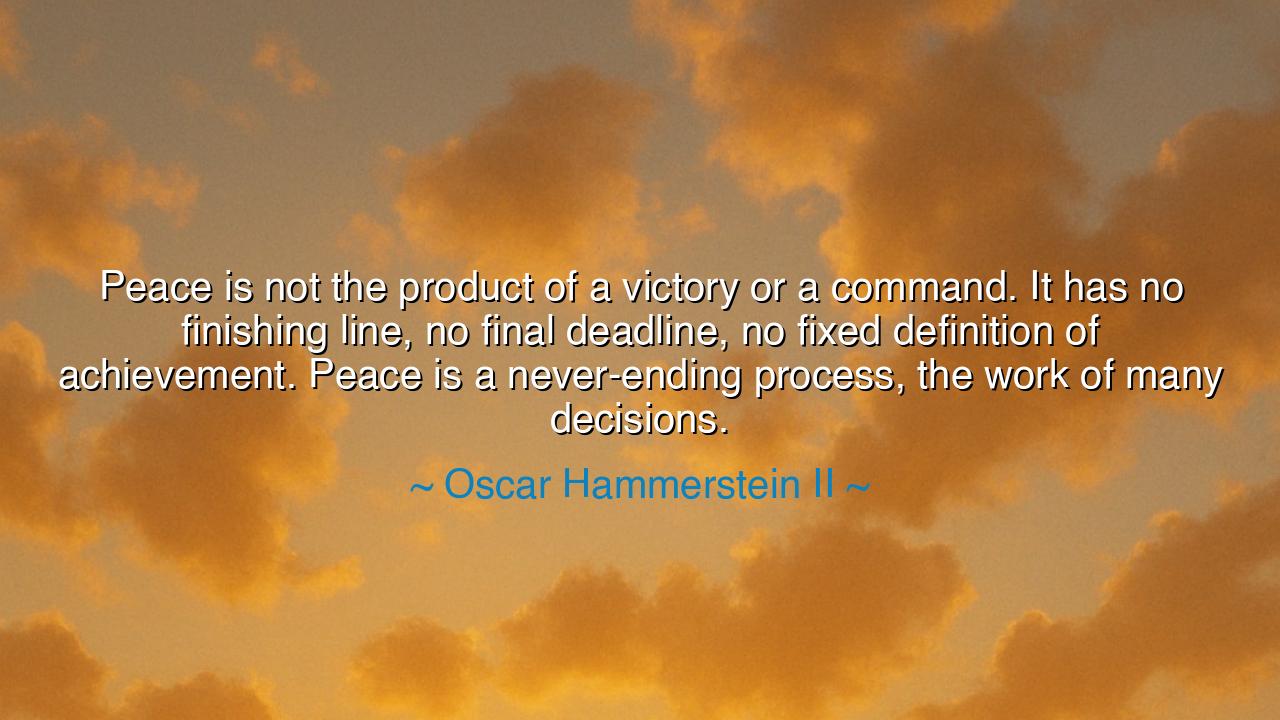
Peace is not the product of a victory or a command. It has no
Peace is not the product of a victory or a command. It has no finishing line, no final deadline, no fixed definition of achievement. Peace is a never-ending process, the work of many decisions.






The poet and lyricist Oscar Hammerstein II, whose words stirred both the theater and the soul, once proclaimed: “Peace is not the product of a victory or a command. It has no finishing line, no final deadline, no fixed definition of achievement. Peace is a never-ending process, the work of many decisions.” Though born of the modern age, his insight carries the timeless weight of the ancients. In these words, he unveils the truth that peace is not a prize won once and for all, but a living process, fragile yet enduring, woven daily by human choice.
To say peace is not the product of a victory is to shatter the illusion that war alone can birth peace. Victory may silence guns, but it cannot silence hatred. Command may order men to stop fighting, but it cannot command reconciliation. Treaties may be signed, yet resentment lingers like embers beneath ashes. Hammerstein teaches us that peace cannot be forced—it must be nurtured, chosen, built anew every day by countless small acts of restraint, forgiveness, and cooperation.
His words remind us of post-World War II Europe. Though the Allies defeated fascism, true peace did not come in the victory parades. It came later, through the painstaking work of rebuilding cities, creating alliances like NATO, and forging the European Union. None of these were born of one victory or one command—they were the fruits of thousands of decisions made in boardrooms, parliaments, and humble homes. In this example we see Hammerstein’s wisdom embodied: peace is not an event, but a process.
History also shows us the danger of forgetting this truth. After the First World War, the victors declared peace through the Treaty of Versailles. But this “peace” was peace in name only—driven by punishment and resentment, it sowed the seeds of the Second World War. Here is proof that peace cannot be declared with a deadline. It must be a continuous act of healing, of seeking understanding, of planting justice where bitterness has grown.
The deeper meaning of Hammerstein’s words is that peace is a discipline, like truth or virtue. It is not a finish line at which humanity collapses in relief; it is a road without end. Every generation must walk it anew, making the choices that sustain it. Peace is forged not only by nations, but by neighbors; not only by treaties, but by daily decisions to speak gently, to forgive quickly, to choose reconciliation over revenge. In this sense, peace is not a lofty abstraction, but a work of hands and hearts in every corner of life.
The lesson for us, children of tomorrow, is that we must never grow complacent. If peace is a process, then it demands vigilance. It demands that each of us, in the realm of family, community, and nation, contribute to its weaving. To believe peace is finished is to abandon it; to recognize it as ongoing is to keep it alive. Peace will never be perfect, never fully achieved—but this is its beauty, for it calls us to ceaseless striving, to noble labor without end.
Practical wisdom must follow. In your own life, practice peace as a series of choices. When anger rises, pause before striking. When wronged, ask if forgiveness may heal more than revenge. When you see division, be a bridge rather than a wall. On the larger stage, support leaders and policies that build cooperation rather than enmity, remembering always that no single command or law secures peace forever—it must be renewed through countless decisions.
Thus, remember Hammerstein’s timeless teaching: peace has no finishing line, no deadline, no fixed definition of achievement. It is a never-ending process. Do not seek peace as a destination; live it as a journey. And if you commit to that journey—step by step, decision by decision—you will become not only a witness of peace, but its builder, its guardian, and its legacy for generations to come.






AAdministratorAdministrator
Welcome, honored guests. Please leave a comment, we will respond soon